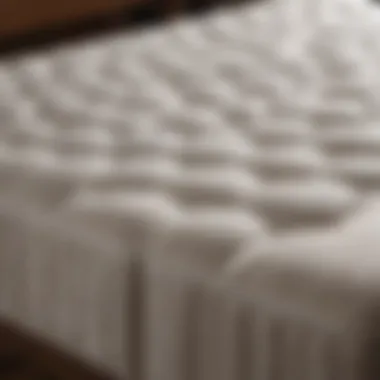The Ultimate Guide to Choosing the Best Bed Mattress


Intro
Choosing the right bed mattress can significantly affect sleep quality, health, and overall well-being. This guide will explore various factors influencing the decision to find the ideal mattress. From materials that provide support to innovative designs that enhance comfort, every aspect plays a role in your ultimate satisfaction.
Importance of Material Composition
The materials used in the construction of a mattress are crucial. Memory foam is known for its ability to contour to the body. This provides support for the spine and relieves pressure points. Latex mattresses offer durability and a bouncy feel, making them a preferred choice for many. Innerspring mattresses, with their network of coils, offer breathability and a firmer feel.
Health Considerations
Sleep impacts overall health. A good mattress can help reduce back problems, alleviate allergies, and improve sleep posture. Certain mattress types come with hypoallergenic covers and materials. It's essential to consider personal health needs when selecting a mattress.
Personal Preferences
Each individual has unique sleeping habits and preferences. Some prefer a softer mattress for plush comfort, while others may opt for a firmer feel to support their body properly. Additional features like temperature regulation and motion isolation play significant roles, especially for couples.
Innovations in Mattress Design
The mattress industry constantly evolves, introducing new designs and features. Recent innovations include adjustable mattresses that allow couples to set different firmness levels on each side. Smart mattresses with built-in sensors track sleep patterns. These advancements not only enhance comfort but also provide insights into improving sleep quality.
The Impact of Sleep Quality on Well-Being
Quality sleep leads to improved cognitive function, physical health, and emotional well-being. A well-chosen mattress directly contributes to achieving restful sleep. Understanding the intricacies of mattress selection ultimately enhances daily living and leads to a healthier lifestyle.
In the following sections, we will dive deeper into these topics, providing comprehensive insights to aid your decision-making process.
"A good mattress is an investment in your health and well-being. Many people overlook this vital component of their sleep environment."
Your understanding of mattress composition and personal needs will unlock the path to the perfect mattress.
Understanding Mattress Types
The selection of a mattress is crucial in ensuring a comfortable and restorative sleep. The variety of mattress types available on the market caters to different preferences, needs, and sleeping positions. When exploring the landscape of mattresses, it's essential to recognize how each type provides distinct benefits and features.
Memory Foam Mattresses
Memory foam mattresses are known for their ability to conform to the body's contours. This characteristic offers excellent support and pressure relief, particularly for individuals who experience joint pain. The foam's viscoelastic properties allow it to mold to one's shape while also providing cushioning. Additionally, memory foam typically has motion isolation properties, meaning that movement on one side of the bed does not disrupt the other side. This feature is especially beneficial for couples.
However, memory foam can retain heat, which some users find uncomfortable. To combat this, many manufacturers incorporate cooling gels or ventilated designs into their products. Thus, understanding the specific formulation can help buyers choose a suitable memory foam mattress to balance comfort and temperature regulation.
Innerspring Mattresses
Innerspring mattresses are among the oldest types of mattresses. They utilize coils for support and are known for their bounce and cooling properties. The core support system typically consists of a network of metal springs, which provide a responsive feel and adequate support for various body types. Additionally, these mattresses have a more traditional feel, which may appeal to individuals who prefer a firmer sleeping surface.
However, the overall comfort level of innerspring mattresses significantly depends on the quality of the materials used in the comfort layers above the springs. Cheaper innerspring mattresses may have inadequate padding that leads to discomfort. Buyers should look for options that combine quality coils with superior foams or padding for an improved sleeping experience.
Latex Mattresses
Latex mattresses are made from natural or synthetic latex and offer a unique blend of comfort and support. They are known for their durability and elastic properties, allowing them to bounce back after compression. This makes them an excellent option for those who move frequently during sleep. Furthermore, latex is resistant to dust mites and mold, making it a suitable choice for allergy sufferers.


The firmness of latex mattresses can vary, providing options for those who prefer a softer or firmer feel. However, the price point of latex mattresses can be higher than other types, which leads consumers to weigh the benefits against their budget. It’s important to consider how long-lasting and sustainable these materials are when making a purchase decision.
Hybrid Mattresses
Hybrid mattresses combine elements from various types, typically integrating innerspring coils with memory foam or latex layers. This design aims to offer the best of both worlds—support from coils and comfort from softer materials. Hybrid mattresses can cater to different sleep styles and preferences, making them a versatile choice.
When exploring hybrid options, it's crucial to assess the ratio of coils to comfort materials and the quality of those materials. A well-designed hybrid should provide balanced support and pressure relief, addressing the unique needs of the sleeper. These mattresses are generally suitable for a wide range of individuals, from side sleepers to stomach sleepers, ensuring that everyone can find their ideal comfort level.
The Importance of Mattress Firmness
Mattress firmness is a fundamental aspect of mattress selection. It affects not just comfort but also sleep quality and overall health. Choosing the right firmness can prevent issues such as back pain and restless nights. An understanding of mattress firmness is necessary for anyone looking to invest in a quality sleep experience.
How Firmness Affects Sleep Quality
Firmness can greatly influence how well you sleep. A mattress that is too soft may not provide adequate support for your spine. When the spine is out of alignment due to inadequate support, it can lead to discomfort and tossing and turning throughout the night. On the other hand, a mattress that is too firm can create pressure points, especially for side sleepers. It is a delicate balance that one needs to consider when choosing a mattress.
Research indicates that individuals prefer different firmness levels based on sleeping positions. For instance, back sleepers often require a medium-firm mattress to keep their spine aligned. Side sleepers may benefit from a softer mattress that can contour to their body shape, while stomach sleepers might prefer something firmer to prevent their back from arching excessively.
"The right mattress firmness is crucial for a restorative night's sleep, leading to a healthier lifestyle."
Identifying Your Ideal Firmness Level
Finding your ideal firmness level involves self-assessment and awareness of your sleep habits. Start by considering your preferred sleeping position. From there, test out different mattresses if possible.
Some tips for identifying the appropriate level of firmness include:
- Back Sleepers: Try a medium-firm mattress to support the natural curve of your spine.
- Side Sleepers: A softer mattress can help alleviate pressure on your shoulders and hips.
- Stomach Sleepers: Opt for a firmer mattress to avoid spinal misalignment.
In addition, personal preferences play an essential role. Some may find mattresses with foam layers soothing, while others prefer the bounce and support of innerspring mattresses. This subjective experience means there is no one-size-fits-all decision. Most buyers should take advantage of trial periods provided by many brands to find that elusive sweet spot in firmness.
Health Implications of Mattress Selection
Selecting the right mattress goes beyond mere comfort. It plays a crucial role in overall health. A mattress can significantly affect various aspects of well-being. These include body alignment, allergy sensitivity, and temperature regulation. Understanding these factors can help one make an informed investment.
Impact on Spine Alignment
Spinal alignment is vital for maintaining good posture during sleep. An unsuitable mattress can lead to back pain, neck stiffness, and discomfort. Memory foam, for instance, contours to the body, offering support where needed. It helps keep the spine in a neutral position. This can prevent misalignment and reduce the risk of chronic pain.
A softer mattress may feel cozy, but it can bow under weight, causing the spine to curve. Conversely, a mattress that is too firm might not accommodate the body's natural curves. Ideally, one should choose a mattress that provides adequate support while also being comfortable.
Proper spinal alignment during sleep can lead to better rest and improved health.
Allergies and Material Sensitivities
Materials used in a mattress can also trigger allergies or sensitivities for some people. For example, traditional innerspring mattresses can harbor dust mites and mold over time. This can be problematic for those with allergies. Latex mattresses are often hypoallergenic and resistant to dust mites, making them a great option. Memory foam mattresses can also be made with hypoallergenic materials. Opting for a mattress that features organic materials can further reduce potential allergens. Always check labels and material details to avoid unwanted reactions.
Temperature Regulation for Better Sleep
Temperature regulation is another key factor in choosing the right mattress. Poor materials can trap heat and disrupt sleep. Memory foam, for example, tends to retain heat. Newer models, however, come with cooling gel layers to combat this issue.
Latex mattresses often allow for better airflow, keeping the sleep surface cooler. Maintaining an optimal sleep temperature can lead to more restful nights and improved overall health. Investing in breathable materials is essential for those who sleep hot or live in warmer climates.
Innovations in Mattress Technology


Understanding the latest innovations in mattress technology is crucial in today's sleep market. As consumer expectations evolve, mattress manufacturers respond with creative solutions that enhance comfort, support, and convenience. These innovations can positively impact sleep quality and overall well-being, making informed purchasing decisions essential for anyone seeking a better night’s rest. Emerging technologies not only cater to individual preferences but also address specific health concerns and environmental sustainability. With these advancements, finding the ideal mattress becomes less daunting, opening up a multitude of options suited to diverse needs.
Smart Mattresses
Smart mattresses represent a significant leap in the realm of sleep technology. These mattresses come equipped with sensors and connectivity features that monitor sleep patterns, body movements, and temperature. By collecting and analyzing data, smart mattresses can provide personalized insights into sleep habits, helping users optimize their resting conditions. Some models even adjust firmness levels or temperature automatically based on user preferences or sleep cycles. This level of customization enables individuals to make informed adjustments to enhance their sleep experience.
Additionally, many smart mattresses integrate with apps that track sleep quality and provide recommendations for improvement. This functionality empowers users to take charge of their sleep health, potentially leading to more restorative nights. The shift towards data-driven sleep solutions may shape future purchasing trends as consumers increasingly seek early insights into their well-being.
Eco-Friendly Materials
The demand for eco-friendly materials in mattress manufacturing has surged as consumers become more conscious of environmental impacts. Memory foam, latex, and innerspring mattresses are now being produced with sustainably sourced components. For instance, organic latex is harvested from rubber trees without harmful chemicals, providing a healthier sleeping surface. Further, some brands use recycled materials in their mattress construction, reducing waste and promoting sustainability.
Choosing eco-friendly mattresses not only contributes to a healthier planet but also offers considerable health benefits. Many eco-conscious fabrics are naturally hypoallergenic and resistant to dust mites and mold, creating a cleaner sleep environment. Options like bamboo and Tencel are known for their moisture-wicking properties, keeping the mattress cool and comfortable. This paradigm shift towards sustainability allows buyers to align their purchasing decisions with their values, ensuring that ltheir choice contributes positively to the environment.
Customizable Options
The rise of customizable options in mattress technology enables consumers to tailor their sleep surface to match individual preferences. Modular mattress designs allow users to adjust the firmness level by changing out specific layers, accommodating varying comfort needs. Many companies now offer split mattresses, which permit partners to select different firmness levels on either side, fostering a more harmonious sleeping environment.
In addition to firmness, some brands also provide options for material combinations. Shoppers can mix latex, memory foam, and gel-infused materials in one mattress, creating a personalized sleeping zone that adheres to specific body contours while maintaining temperature regulation. This flexibility is particularly valuable for couples with differing preferences, ensuring both parties achieve optimal comfort without compromise.
With the incorporation of innovative features and personalized adjustments, discerning buyers are better equipped to choose their ideal mattress. The ongoing evolution of mattress technology will likely continue to advance, providing diverse and targeted solutions for the well-being of consumers.
Evaluating Mattress Brands
Choosing a mattress brand is a significant part of finding the right bed mattress for one's needs. This stage requires careful scrutiny and consideration of various factors that can affect the overall satisfaction and quality of sleep. Since the market is filled with countless brands, each offering its unique features and propositions, it is crucial to prioritize certain elements that can inform and shape the purchasing decision. Evaluating the reputation of brands, reading reviews, understanding warranty policies, and recognizing trial periods can lead to a more satisfactory mattress buying experience.
Reputation and Reviews
The reputation of a mattress brand plays a pivotal role in influencing consumer choices. Often, a well-established brand boasts a track record of successful products and satisfied customers. Brand reputation can be assessed by looking at how long they have been in the market, the quality of their customer service, and their response to consumer feedback.
Reviews from other customers provide invaluable insights. These can be found on various platforms, including retailers' websites, social media, and specialized review sites. Reading both positive and negative experiences can help prospective buyers understand the characteristics of the mattress they are considering. Look for patterns in the feedback. If numerous customers mention issues with durability or comfort, it may warrant further investigation into that particular brand.
"A mattress is a long-term investment, so choose wisely. Your sleep and health depend on it."
Among the many brands, Purple, Tempur-Pedic, and Saatva have emerged with strong reputations due to consistent performance and customer satisfaction. Assessing what other users say about these brands may foster a sense of confidence in purchasing decisions.
Warranty and Trial Periods
Warranty policies are critical when selecting a mattress. A robust warranty indicates that a brand stands behind its product. Typically, warranties can range from 10 to 25 years, covering defects in materials or workmanship. It's essential to thoroughly read the warranty terms to know what's included and excluded. Additionally, understanding the process required for filing a claim is equally important.
Trial periods are another vital aspect. Many modern brands offer trial periods ranging from 30 to 365 days. This allows consumers to test the mattress in the comfort of their own home, ensuring it meets their needs and preferences. If a buyer finds that the mattress does not suit them during the trial, they can return it, often with little hassle. Brands like Helix, Leesa, and Nolah are known for offering generous trial periods which can greatly benefit potential customers.
Understanding brand reputation and examining warranty and trial options sets a solid foundation for making informed decisions in mattress selection. These steps can greatly enhance the likelihood of finding a bed that not only promises comfort but is also durable and reliable.
Budget Considerations
When choosing the right mattress, budget is a critical factor. It influences not only the type and quality of the mattress but also the long-term satisfaction of the buyer. A well-thought-out budget ensures that individuals pick a mattress that suports their sleep quality without overspending or sacrificing essential features. This section will explore the importance of understanding price points and offer alternatives that maintain quality while being financially sensible.
Understanding Price Points


The diversity of mattress options in the market can create confusion regarding prices. Memory foam, innerspring, latex, and hybrid mattresses vary significantly in cost, often depending on the materials used and the technology incorporated. Generally, mattresses are categorized into three price segments: low-end, mid-range, and high-end.
- Low-end mattresses typically range from $200 to $600. They may suffice for temporary use but may lack durability.
- Mid-range mattresses, costing between $600 and $1,200, often offer better quality and comfort, combining various materials for a more balanced experience.
- High-end mattresses, priced above $1,200, usually involve advanced materials, exceptional craftsmanship, and longer warranties, often translating to improved sleep quality and support.
Understanding these price points helps buyers align their budget with expectations and find suitable options.
Cost-Effective Alternatives
Finding a quality mattress within a stricter budget does not mean compromising comfort or durability. Several cost-effective alternatives exist that can provide excellent sleep quality without significant financial strain.
- Consider discounted models. Many brands offer previous year's models at reduced prices.
- Look for online-only mattress brands. Companies like Tuft & Needle and Zinus often provide quality with competitive pricing due to lower overhead costs.
- Explore refurbished mattresses. Some retailers sell gently used mattresses at a fraction of the price, ensuring still decent quality while being eco-conscious.
- Use promotions and sales events. Black Friday, Memorial Day, and Labor Day often present opportunities for substantial savings.
- Evaluate financing options. Some retailers offer monthly payment plans with little to no interest, making it easier to manage costs.
By exploring these options, users can find mattresses that meet their individual needs without overspending, ultimately enhancing their sleeping experience.
Caring for Your Mattress
Caring for your mattress is a crucial aspect of maintaining not only the item itself but also your overall sleep quality. A neglected mattress might generate discomfort and health issues over time, so proper care is essential. From improving longevity to enhancing sleep quality, this section offers insights on how to keep your mattress in optimal condition.
Cleaning and Maintenance Tips
Regular cleaning of your mattress is vital. Dust, skin cells, and allergens can accumulate, creating an unhealthy sleep environment. Here are some actions to take:
- Vacuuming: Use a vacuum cleaner with an upholstery attachment to remove dirt and dust. Aim to do this at least monthly.
- Spot Cleaning: If there are stains, make a solution of mild detergent and water. Use a cloth to blot the stain gently without soaking the mattress.
- Deodorizing: Sprinkle baking soda on the mattress and let it sit for 15-30 minutes, then vacuum it off. This helps eliminate odors.
- Protective Covers: Invest in a good quality mattress protector. This not only shields against spills but also prevents dust mites and other allergens from reaching your mattress.
Establishing a cleaning schedule will ensure these tasks are done regularly, thereby prolonging the life of your mattress and improving your health.
When to Replace Your Mattress
It is important to be aware of the signs that indicate your mattress needs replacing. Most mattresses have a lifespan of about 7 to 10 years, but various factors can influence this timeline. Here are some indicators:
- Visible Wear and Tear: If your mattress has sagging spots, lumps, or other visible imperfections, it is time to consider a new one.
- Diminished Comfort: If you find you wake up with aches and pains regularly, your mattress may no longer provide adequate support.
- Allergies: Increased symptoms of allergies, such as sneezing or congestion, might signal that your mattress is host to dust mites or mold.
- Noise: If your mattress makes noise when you move, it could be a sign of structural damage.
"Routine care and timely replacement of your mattress are essential for sustaining a healthy sleep environment."
The key is to listen to your body and observe the performance of your mattress. A timely replacement can lead to significant improvements in sleep quality.
Finale and Recommendations
In establishing a comprehensive guide to selecting the best mattress, the concluding section serves as a critical synthesis of the insights discussed throughout the article. Understanding the nuances of mattress selection can be overwhelming due to the myriad of options available today. Thus, this section aims to clarify key takeaways and encourage informed decision-making in your mattress investment.
Summary of Key Considerations
- Understanding Mattress Types: Familiarize yourself with various mattress types, such as memory foam, innerspring, latex, and hybrid. Each type has its unique features and benefits that cater to different sleeping preferences.
- Firmness Levels: The importance of mattress firmness cannot be overstated. It affects your sleep quality and overall comfort. Identify your preferred firmness level based on sleep position and personal comfort.
- Health Implications: Consider how your mattress impacts health, specifically spine alignment, allergies, and temperature regulation. A mattress that aligns with your health needs is essential for restful sleep.
- Innovative Features: Stay updated on trends like smart mattresses or eco-friendly materials. These innovations not only enhance comfort but can lead to better sleep quality.
- Brand Evaluation: Research different mattress brands by checking their reputation and customer reviews. It's also vital to understand warranty options and trial periods offered by each brand.
- Budget: Be mindful of your budget without compromising quality. Knowing different price points and exploring cost-effective alternatives can help you make a smart decision.
Final Thoughts on Choosing the Best Mattress
Choosing the right mattress is a personal journey. What works for one person may not necessarily work for another. When embarking on this search, take time to assess your needs while exploring all available options. Providing a balance between comfort and support should be your primary objective.
Additionally, don’t shy away from utilizing trial periods to test mattresses before making a final decision. Pay close attention to how you feel during the trial period and adjust as necessary.
At the end of the day, a mattress is much more than just a bed; it is an investment in your sleep and health. By following the recommendations in this guide, you can enhance your sleeping experience significantly. A quality mattress contributes to better sleep, which is foundational for overall wellness.
"A good mattress is an essential part of a healthy lifestyle. Your body deserves the best sleeping environment."
Arming yourself with knowledge and carefully considering your options will ultimately lead you to a mattress that meets your unique needs, providing comfort and support for years to come.















